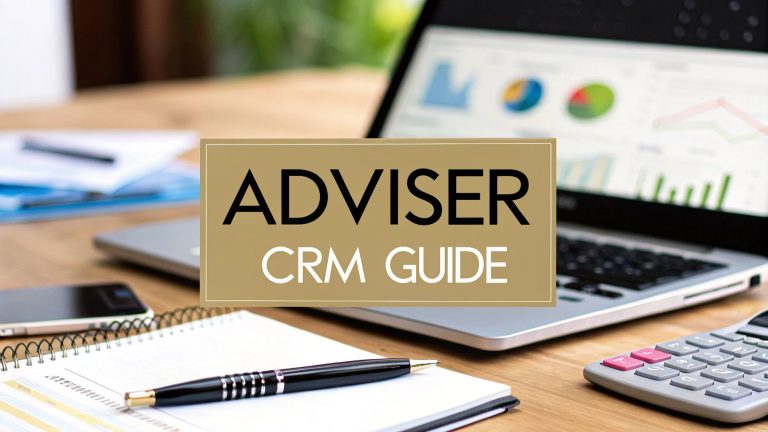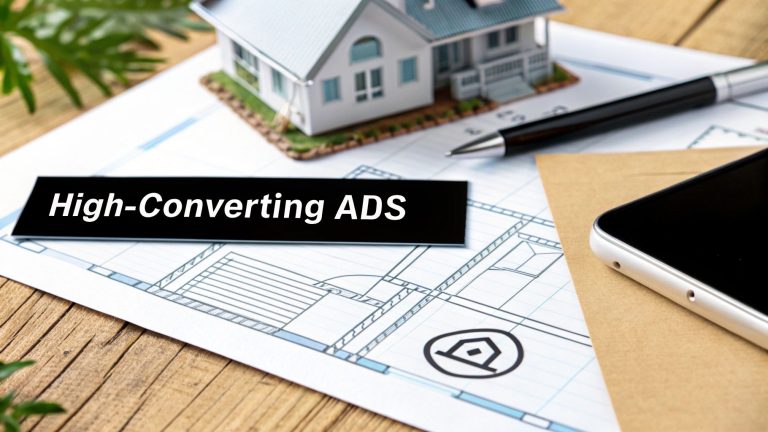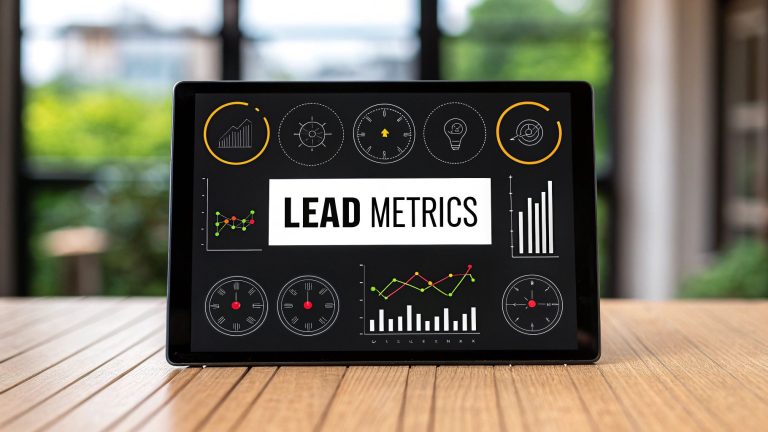12 Best CRM for Agencies in 2025: A Detailed Review
Running a successful agency means juggling multiple clients, complex projects, and a constant flow of new business opportunities. A simple spreadsheet or a generic contact manager just won't cut it. To scale efficiently, you need a centralized system that tracks leads, manages client relationships, and streamlines your sales process. Moving beyond a basic contact list, agencies require sophisticated tools for effective sales pipeline management to truly thrive.
This guide cuts through the noise to provide a detailed breakdown of the 12 best CRM for agencies, helping you find the right tool to manage your pipeline, automate tedious tasks, and drive predictable growth. We dive deep into each platform, evaluating them on the features that matter most to agency workflows. You'll find practical analysis, screenshots, and direct links for every option.
We will analyze key features, real-world use cases, and crucial integrations-like how to automatically sync Facebook leads using tools like LeadSavvy Pro-so you can make an informed decision without the marketing fluff. Forget generic lists; this is an actionable resource designed to match your agency's specific size, workflow, and client management needs. Let's find the perfect system to organize your operations and unlock new revenue.
1. HubSpot Sales Hub
HubSpot Sales Hub is an all-in-one platform that combines robust CRM functionalities with sales, marketing, and service tools. For agencies, its primary strength lies in offering a unified ecosystem to manage not only your own sales pipeline but also client projects and marketing campaigns. It eliminates the need to integrate disparate tools, providing a single source of truth for all customer interactions. This makes it a standout CRM for agencies looking to scale operations efficiently.
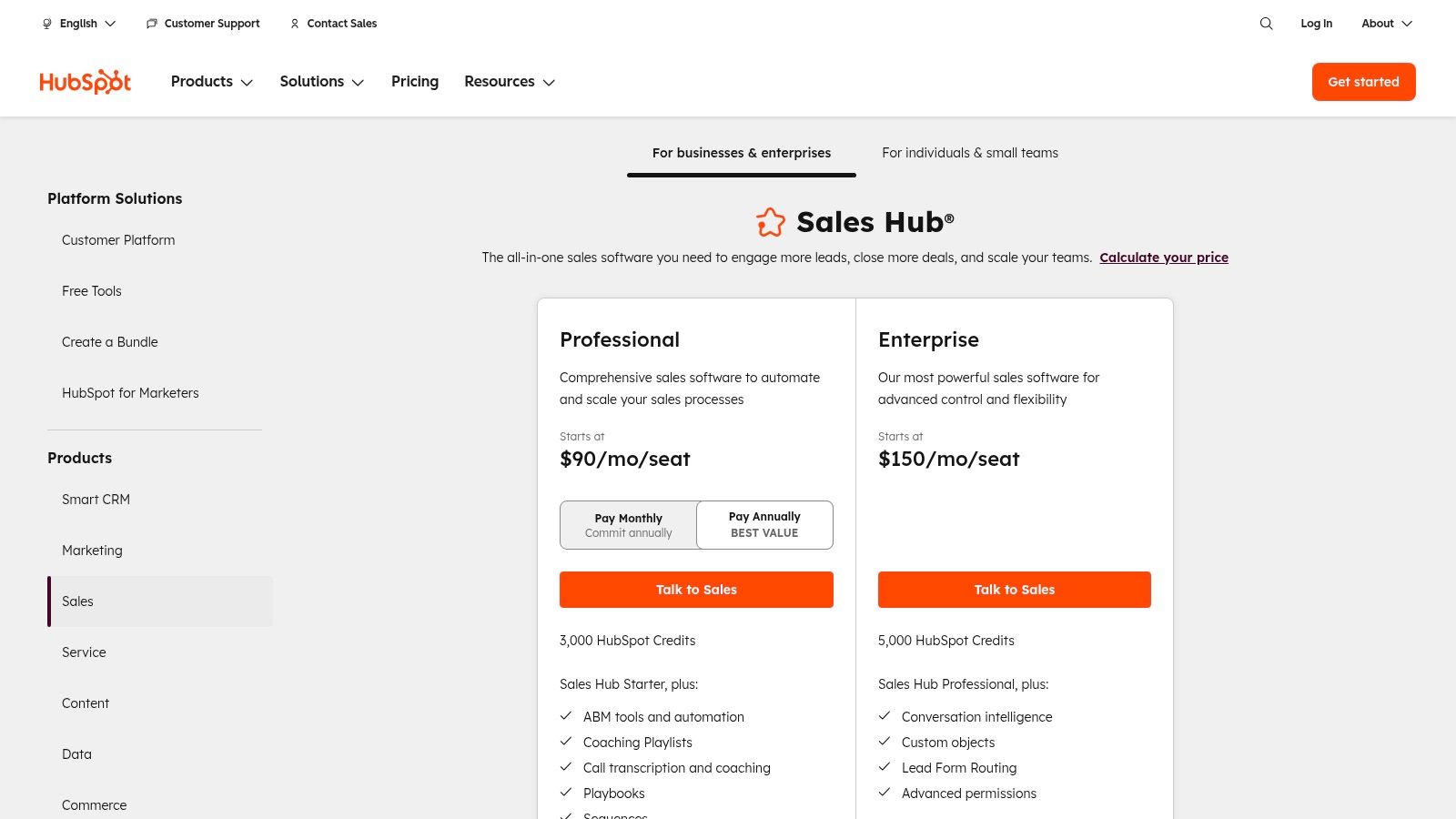
The platform is renowned for its user-friendly interface and extensive training resources via HubSpot Academy, which significantly eases team onboarding. Agencies can leverage features like email sequences for automated outreach, meeting scheduling tools to reduce back-and-forth with prospects, and detailed analytics to track sales performance.
Key Details & Pricing
- Best For: Agencies of all sizes seeking a scalable, all-in-one solution that grows with them.
- Key Features: Sales automation, advanced CRM, meeting scheduling, quotes, and detailed reporting.
- Pricing: Offers a powerful free CRM to start. Paid Sales Hub plans begin at $15 per user/month (Starter), with Professional and Enterprise tiers adding advanced features and higher costs. Be mindful of mandatory onboarding fees for higher tiers.
- Website: https://hubspot.com/pricing/sales
Pros:
- Scales from a free, simple CRM to an enterprise-level powerhouse.
- Excellent integration with other HubSpot Hubs (Marketing, Service).
Cons:
- Pricing can become complex with per-seat costs and bundled features.
- Advanced automation and reporting are locked behind more expensive tiers.
2. Salesforce Sales Cloud
Salesforce Sales Cloud is the undisputed enterprise leader, offering unparalleled customization and power. For large or fast-growing agencies managing complex client portfolios, its strength lies in its ability to be molded to any specific workflow. It provides deep control over account, lead, and opportunity management, allowing agencies to build out sophisticated, multi-stage pipelines for both their own business development and client project tracking. This makes it an ideal CRM for agencies that require a high degree of process control and scalability.
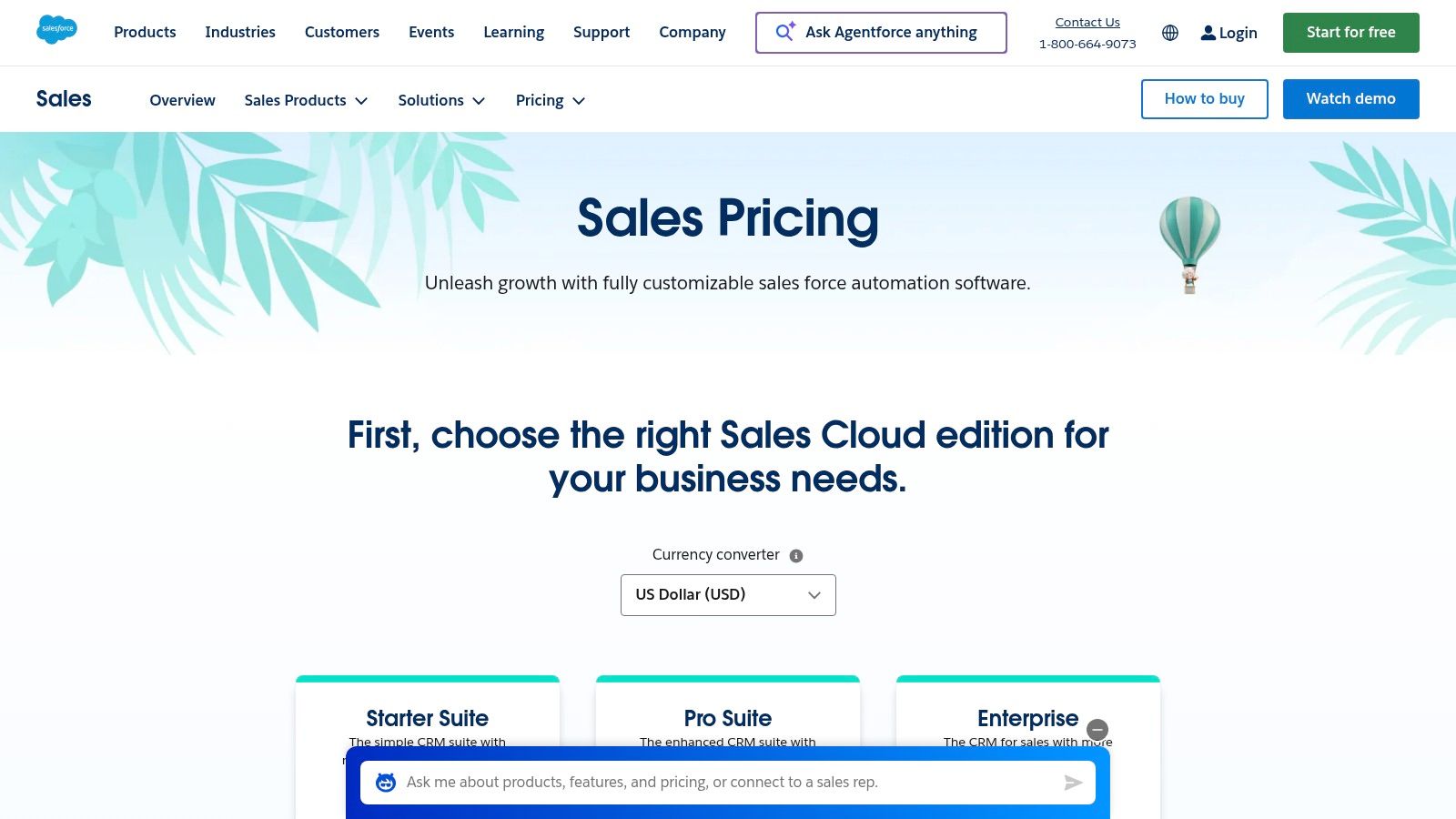
The platform’s real power is unlocked through the AppExchange, a massive marketplace of add-ons that can extend its functionality to virtually any business need. Agencies can benefit from advanced reporting dashboards and forecasting tools to manage revenue across multiple service lines. However, this flexibility comes with a steep learning curve and requires dedicated resources for implementation and maintenance, making a clear understanding of CRM integration crucial.
Key Details & Pricing
- Best For: Larger agencies or those with complex, multi-pipeline requirements needing deep customization.
- Key Features: Advanced account and opportunity management, robust reporting and dashboards, and extensive customization via the AppExchange.
- Pricing: Plans start at $25 per user/month (Essentials). More feature-rich tiers like Professional and Enterprise add significant functionality and cost. Add-ons can increase the total price substantially.
- Website: https://salesforce.com/sales/pricing
Pros:
- Extremely customizable and scalable to fit any agency process.
- Rich analytics and forecasting capabilities for managing growth.
Cons:
- Can be expensive and complex to implement, often requiring a specialist.
- Add-ons and AI features add significant cost; the total cost of ownership can be high.
3. Zoho CRM
Zoho CRM is a highly versatile platform known for its extensive feature set and competitive pricing, making it a powerful contender for agencies managing diverse client needs. Its strength lies in the tight integration with the broader Zoho ecosystem, which includes over 45 applications for finance, marketing, and collaboration. This allows an agency to build a nearly all-in-one operational suite from a single vendor, streamlining data flow and reducing software costs significantly. It’s an ideal CRM for agencies looking for deep customization without an enterprise-level price tag.
The platform offers robust lead and deal management, workflow automation, and on higher tiers, an AI-powered sales assistant named Zia. Agencies can leverage its customization capabilities to create modules and fields that perfectly match their client reporting or project management workflows. While the interface can have a steeper learning curve than some competitors, the sheer breadth of functionality provides a scalable foundation for growth.
Key Details & Pricing
- Best For: Agencies needing a cost-effective, highly customizable CRM with the option to expand into a full business suite.
- Key Features: Lead and deal management, workflow automation, large integration catalog, and custom objects on upper tiers.
- Pricing: A free edition is available for up to 3 users. Paid plans start at $14 per user/month (Standard), with Professional, Enterprise, and Ultimate tiers offering more advanced features like AI and customization.
- Website: https://zoho.com/crm
Pros:
- Extremely competitive pricing and scalable plans.
- Broad native app suite reduces the need for multiple third-party vendors.
Cons:
- Advanced AI and deep customization are only available in higher-priced tiers.
- The learning curve and support experience can be inconsistent.
4. Pipedrive
Pipedrive is a sales-focused CRM renowned for its simplicity and highly visual approach to pipeline management. For agencies that prioritize a straightforward and clean deal flow, it offers an intuitive platform that sales teams can adopt with minimal friction. Its core strength is visualizing the entire sales process, allowing agency owners and account managers to see exactly where prospects are at a glance, from initial contact to a closed deal. This makes it an excellent CRM for agencies that need to get up and running quickly without a complex setup.
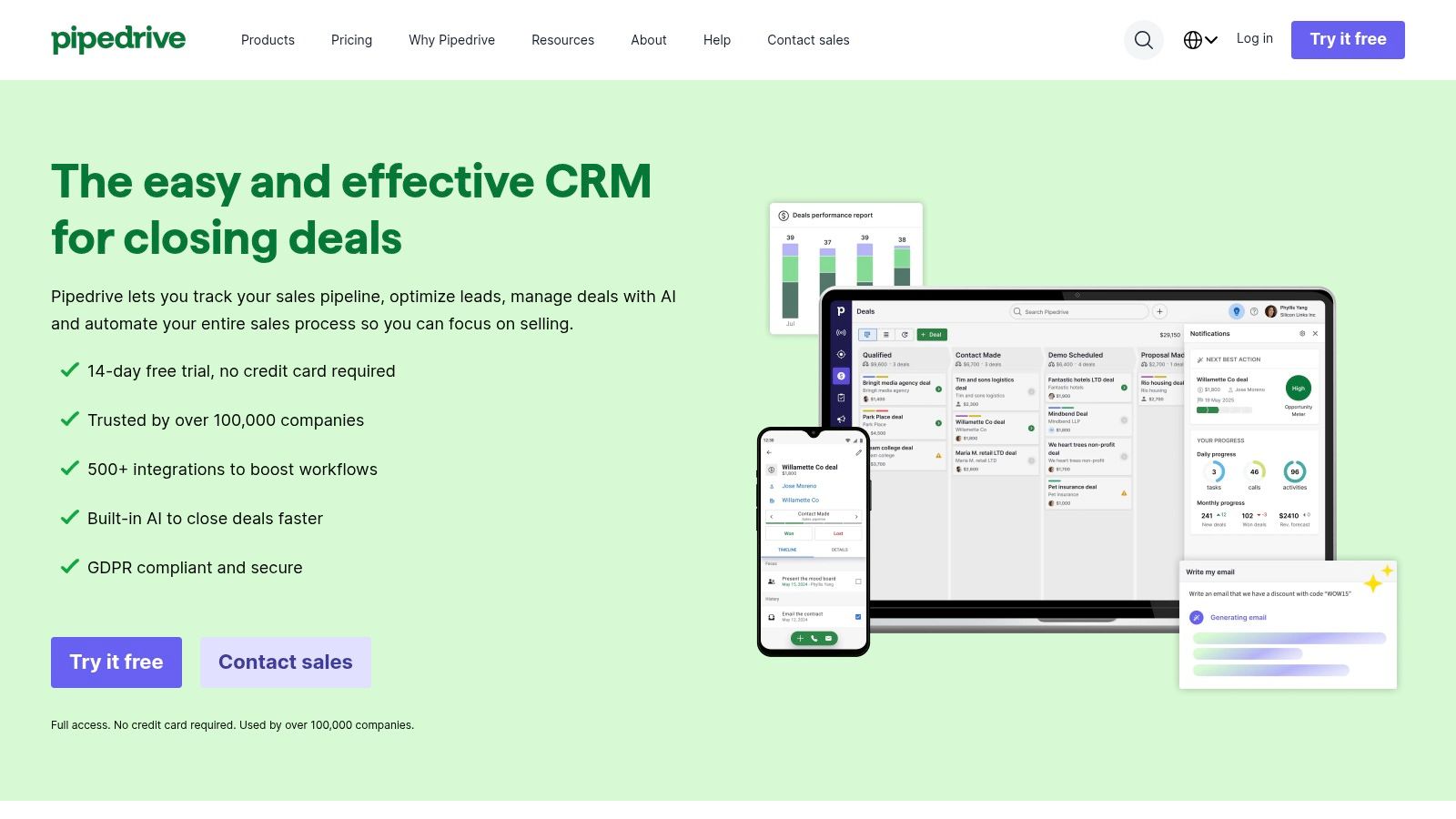
The platform strips away the complexity found in broader systems, focusing purely on sales activities and pipeline velocity. Agencies benefit from features like workflow automations that handle repetitive tasks, built-in tools for creating and sending proposals or contracts, and an AI sales assistant that provides performance tips and reporting insights. With over 500 integrations, it connects easily to an agency's existing tech stack.
Key Details & Pricing
- Best For: Small to mid-sized agencies that need a dedicated, easy-to-use sales pipeline tool.
- Key Features: Visual sales pipelines, workflow automation, AI-assisted reporting, built-in e-signatures, and a large integration marketplace.
- Pricing: Plans start at $14.90 per user/month (Essential). Tiers like Advanced, Professional, and Enterprise add more features and automation capabilities.
- Website: https://pipedrive.com
Pros:
- Very fast to deploy with an intuitive UI built specifically for sales teams.
- Good value across its pricing tiers, offering incremental depth as you scale.
Cons:
- Marketing and service functionalities are limited or require paid add-ons.
- Lacks the deep, enterprise-grade governance and customization of larger CRMs.
5. monday Sales CRM
monday Sales CRM is built on the highly flexible monday.com Work OS, making it a powerful choice for agencies that already manage projects and client delivery on the platform. Its core advantage is the ability to create a completely custom, visual sales pipeline that seamlessly connects to your operational boards. This unified environment allows teams to track a deal from initial contact through to project completion without ever leaving the monday.com ecosystem, solidifying its place as a top-tier CRM for agencies that value workflow integration.
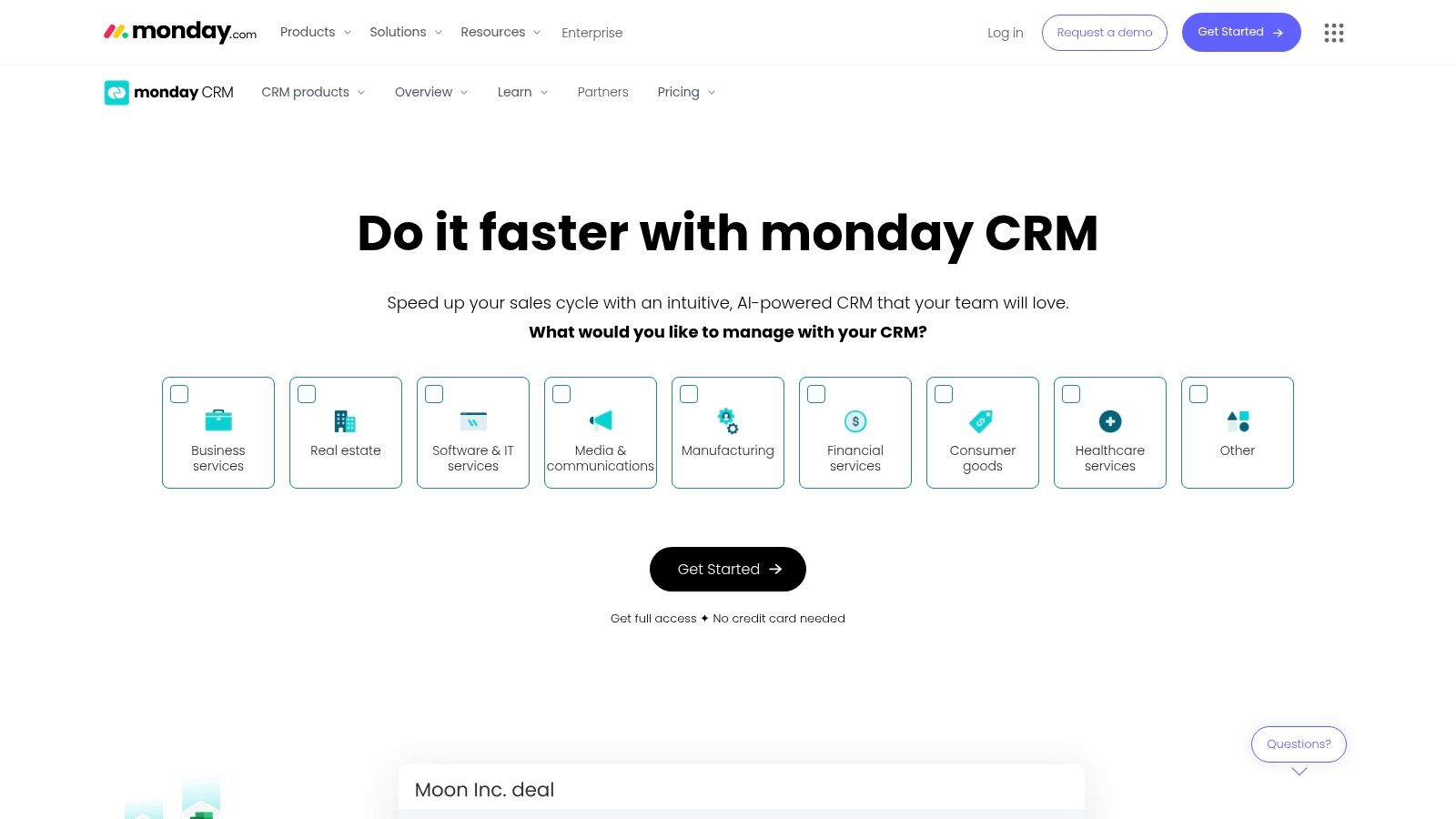
The no-code, drag-and-drop interface allows for deep customization of pipelines, contact records, and dashboards. Agencies can set up powerful automations, like creating a new client project board automatically when a deal is marked as "won," which streamlines handoffs between sales and delivery teams. This centralization reduces administrative overhead and ensures everyone has visibility into the entire client lifecycle.
Key Details & Pricing
- Best For: Agencies already using monday.com for project management or those needing a highly visual and customizable CRM.
- Key Features: Customizable pipelines, automations, centralized client records, email integration, and advanced dashboards.
- Pricing: Built on monday.com's plans. Pricing starts with the Basic plan at $12 per seat/month, with a 3-seat minimum. More advanced CRM features require higher-tier plans like Standard or Pro.
- Website: https://monday.com/crm
Pros:
- Highly visual and adaptable to bespoke agency workflows.
- Unified environment for sales and delivery on one platform.
Cons:
- Pricing requires a minimum user count, which can be a barrier for solo operators.
- Some essential CRM features are only available in more expensive plans.
6. Freshsales (Freshworks)
Freshsales by Freshworks is a modern CRM that emphasizes sales productivity through a clean interface and built-in communication tools. For agencies, its key advantage is the integration of phone, email, and chat directly within the platform, eliminating the need for separate tools and streamlining outreach. The AI assistant, Freddy, offers predictive insights on deals and lead scoring, helping teams prioritize high-value prospects. This makes it an excellent CRM for agencies focused on improving sales velocity and unifying communication channels.
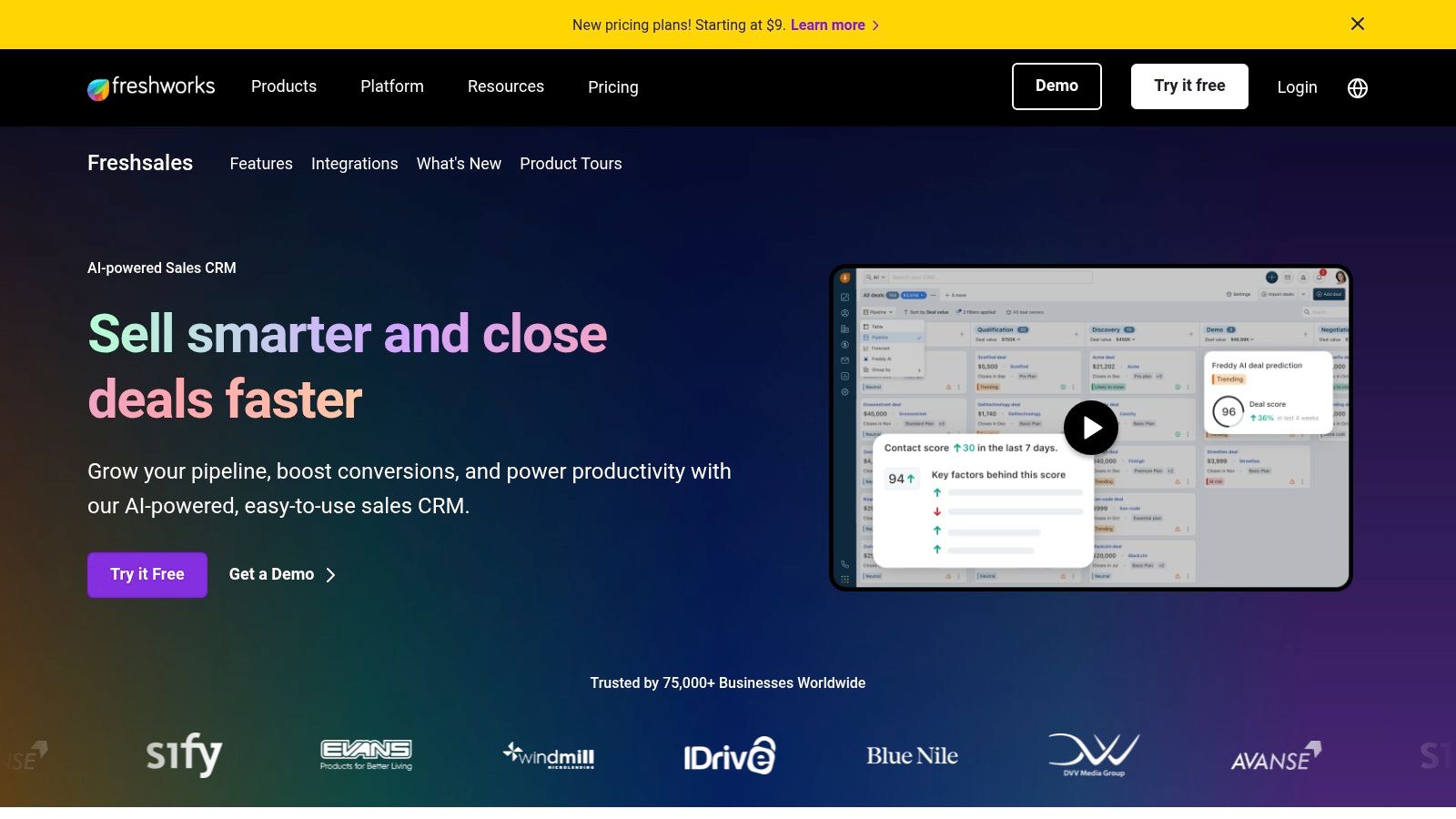
The platform offers a unified sales and marketing option called Freshsales Suite, which is ideal for agencies wanting to manage both client acquisition and marketing campaigns from one place. Its straightforward packaging and competitive pricing, including a functional free plan, make it highly accessible for smaller or growing agencies that need a powerful yet affordable solution without the complexity of larger enterprise systems.
Key Details & Pricing
- Best For: Small to mid-sized agencies needing a sales-focused CRM with built-in communication tools and AI features.
- Key Features: AI-powered insights (Freddy), built-in phone and chat, lead and deal management, and visual sales pipelines.
- Pricing: A free plan is available for basic contact management. Paid plans start at $9 per user/month (Growth), with Pro and Enterprise tiers offering more advanced features like CPQ and custom modules.
- Website: https://www.freshworks.com/crm/
Pros:
- Competitive pricing with a viable free plan for small teams.
- Straightforward packaging with useful built-in outreach tools.
Cons:
- Advanced features like custom modules and audit logs are on higher tiers.
- The third-party app ecosystem is smaller compared to Salesforce or HubSpot.
7. ActiveCampaign
ActiveCampaign is a customer experience automation platform where the CRM is deeply integrated with powerful email marketing tools. Its strength for agencies is its automation-first approach, allowing you to build sophisticated lead nurturing and client communication workflows that trigger sales pipeline movements automatically. Instead of a standalone sales tool, it offers a holistic view of the entire customer lifecycle, making it an excellent CRM for agencies that manage both marketing and sales for their clients.
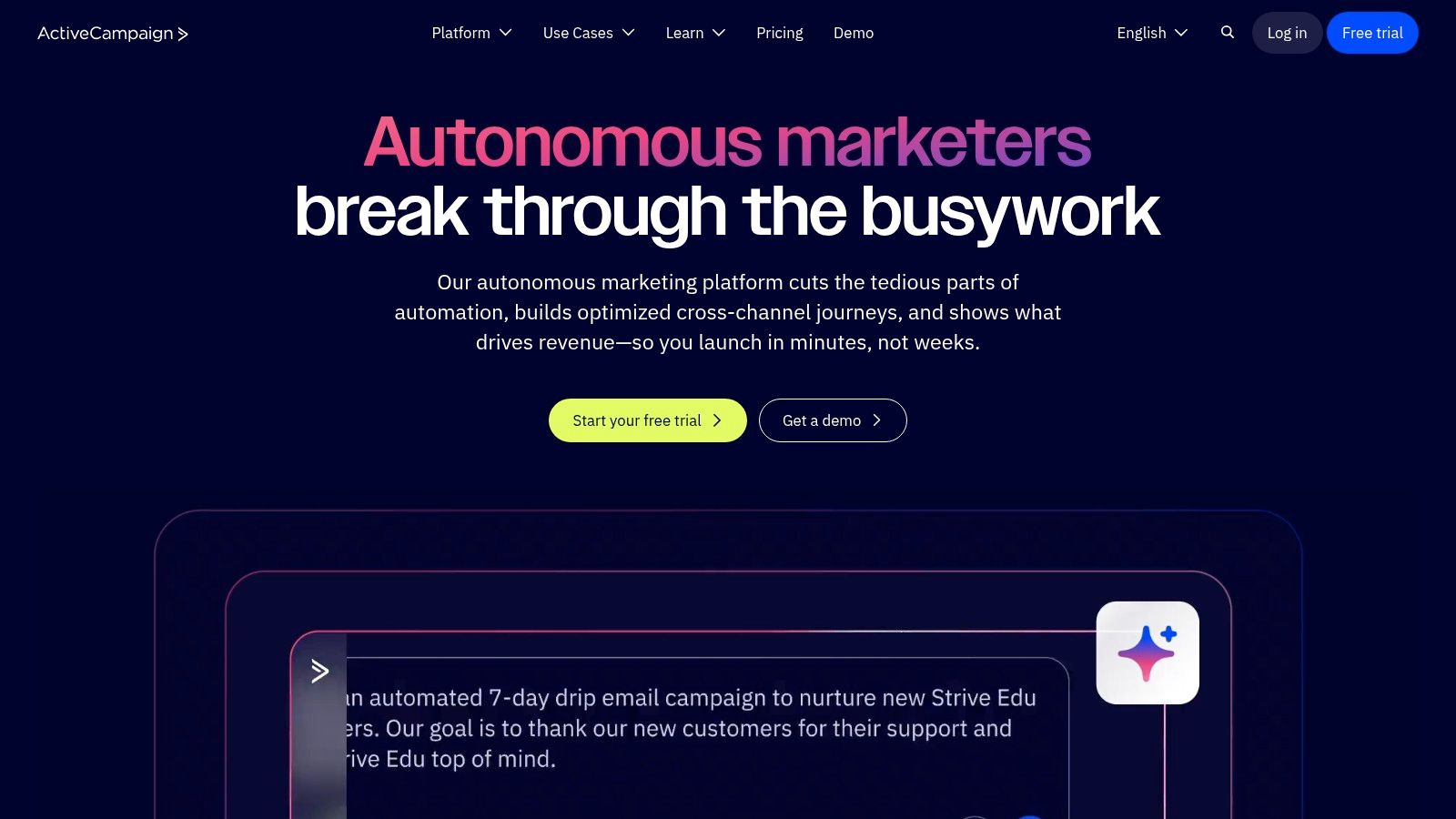
The platform enables agencies to create custom deal pipelines, automate task assignments, and score leads based on their engagement with marketing materials like emails or landing pages. A significant advantage is the agency reseller program, which provides discounts and tools to manage multiple client accounts under one roof, creating a new revenue stream. For a deeper look at its automation capabilities, you can see how it stacks up in a marketing automation software comparison.
Key Details & Pricing
- Best For: Agencies prioritizing deep marketing and sales automation to manage the full customer lifecycle.
- Key Features: Powerful automations, integrated email marketing, CRM deal pipelines, lead scoring, and forms.
- Pricing: Plans are based on contact count and feature tiers. The "Sales" plan, which includes the CRM, starts around $19 per user/month for 500 contacts, with costs increasing with contact list size and added features.
- Website: https://activecampaign.com
Pros:
- Exceptional automation depth that connects marketing actions to sales outcomes.
- Agency Program offers discounts and tools for reselling to clients.
Cons:
- Pricing is tied to contact count, which can make CRM costs variable.
- Primarily a marketing automation tool with a CRM, not a sales-first platform with deep CRM customization.
8. Keap (formerly Infusionsoft)
Keap, formerly known as Infusionsoft, is a powerful all-in-one platform designed to centralize CRM, sales, and marketing automation for small businesses. For boutique agencies and consultants, its strength lies in consolidating disparate functions like contact management, invoicing, and automated follow-ups into a single system. This end-to-end toolkit helps reduce software sprawl, making it an excellent CRM for agencies that want to manage the entire client lifecycle without juggling multiple subscriptions.
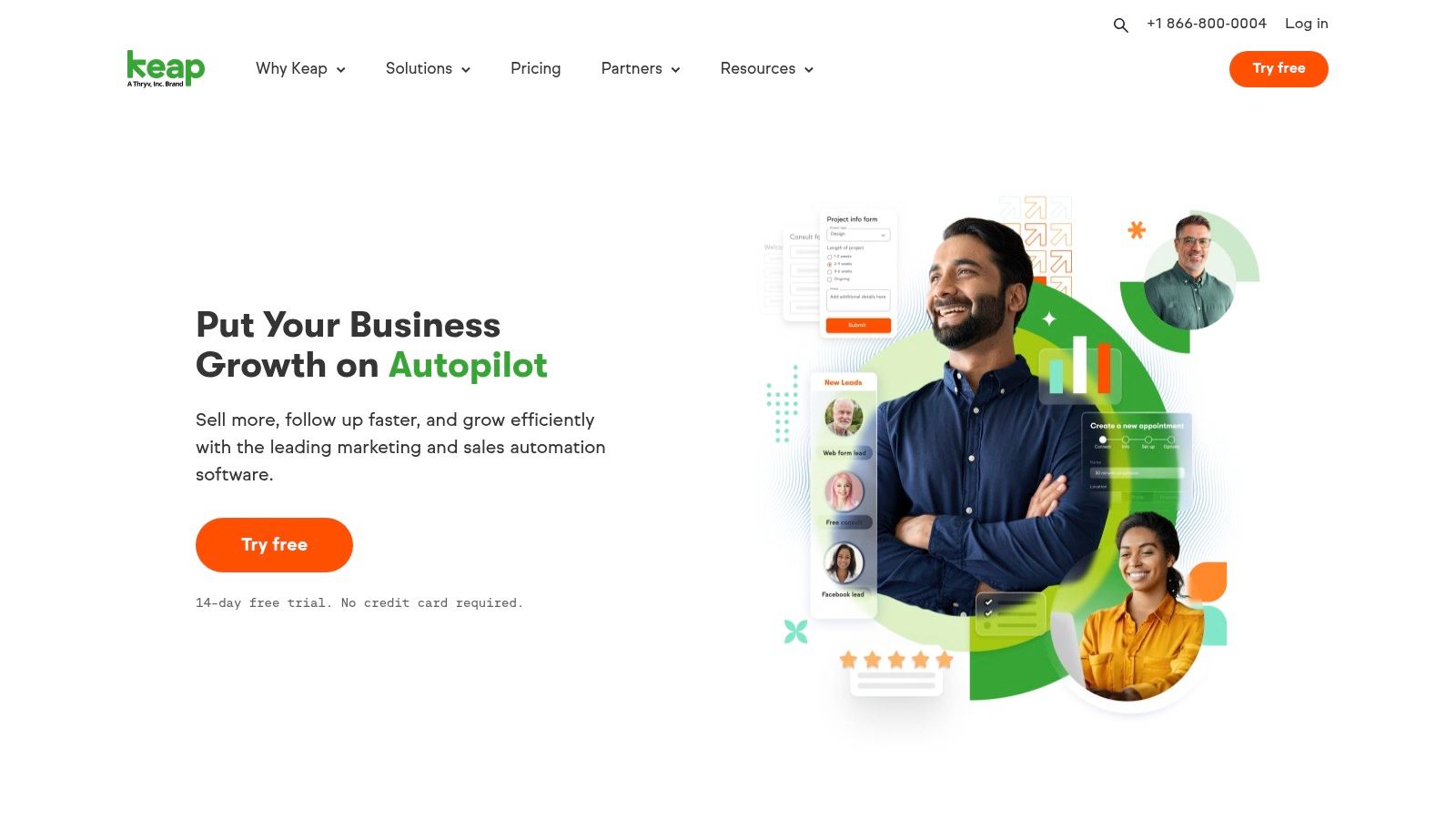
The platform’s visual campaign builder is a key feature, allowing agencies to create sophisticated drag-and-drop automations for both internal sales processes and client marketing campaigns. Native payment processing via Keap Pay and integrated appointment scheduling simplify the administrative side of running an agency, letting you focus more on client work and less on back-office tasks.
Key Details & Pricing
- Best For: Boutique agencies and consultants needing an integrated solution for sales, marketing, and invoicing.
- Key Features: Drag-and-drop automations, invoicing and quotes, native payment processing, and appointment scheduling.
- Pricing: Plans start at $159/month for the Pro tier, which includes 2 users and 1,500 contacts. A Max tier is available for more advanced needs. Expert coaching and setup packages are often required for new users.
- Website: https://keap.com
Pros:
- End-to-end toolkit reduces tool sprawl for small teams.
- Strong onboarding options and done-for-you services are available.
Cons:
- Higher starting price compared to many other SMB CRMs.
- Some users report mixed support experiences on lower-tier plans.
9. HighLevel (GoHighLevel)
HighLevel is an all-in-one platform built specifically for marketing agencies to white-label and resell as their own software. It goes beyond a traditional CRM by bundling in a full suite of marketing tools, including funnels, email and SMS automation, and a unified inbox. This makes it an exceptional CRM for agencies that want to productize their services, create recurring revenue streams, and offer clients a comprehensive, branded platform to manage their marketing and sales.
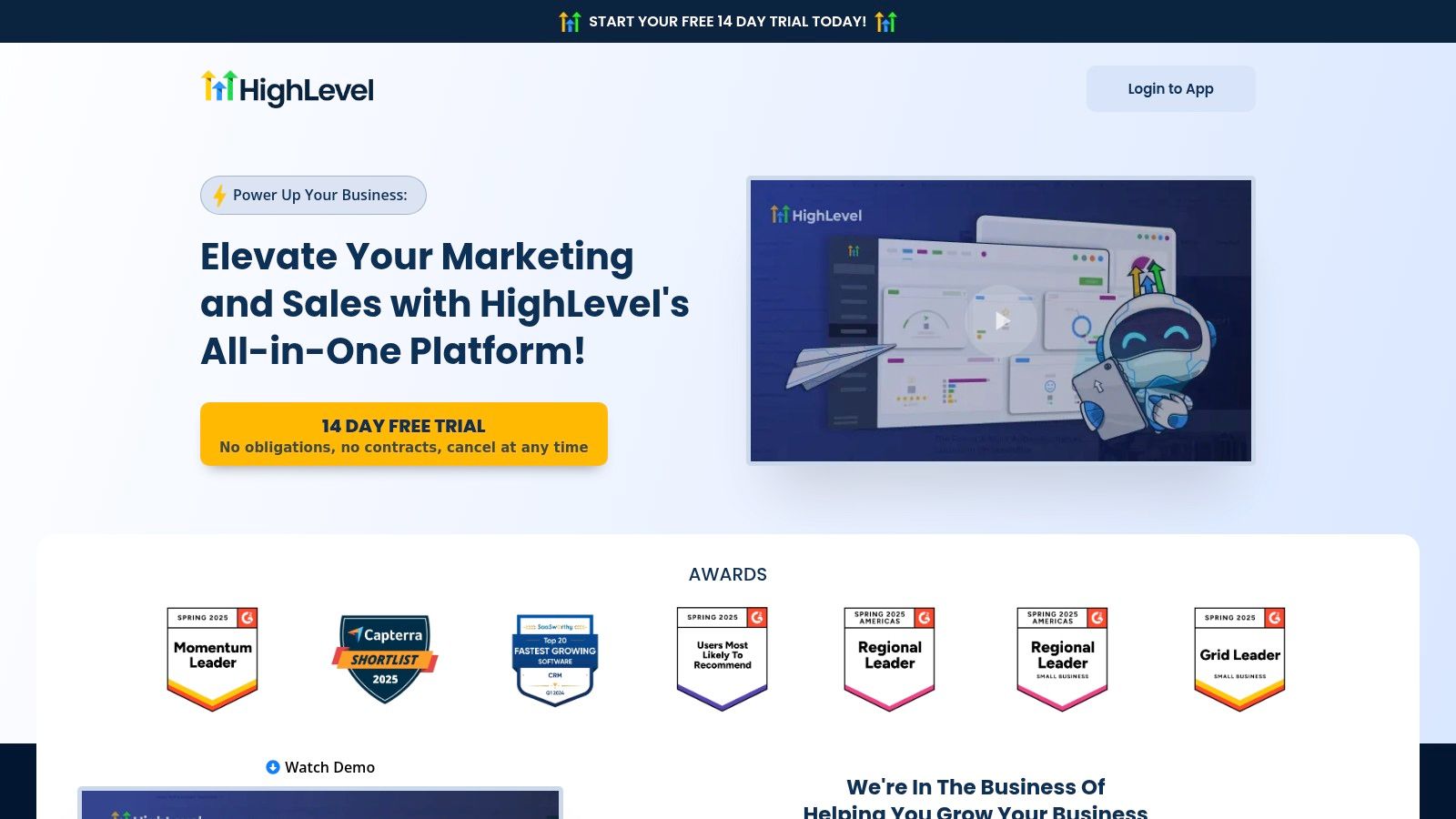
The platform's standout feature is its "SaaS Mode," which allows agencies to create and manage unlimited client sub-accounts, each with its own branding and feature set. Agencies can set their own pricing, mark up usage-based services like SMS, and truly own the client relationship. The extensive marketplace of pre-built "snapshots" and integrations accelerates setup, allowing you to deploy proven marketing systems for clients quickly. For an in-depth look, you can learn more about how HighLevel compares to other CRMs.
Key Details & Pricing
- Best For: Agencies looking to create a white-label SaaS offering and generate recurring revenue.
- Key Features: White-label platform and mobile app, SaaS Mode for client sub-accounts, marketing automation (email/SMS), funnel builder, and a robust marketplace.
- Pricing: Starts with the Agency Starter plan at $97/month for a single business. The Agency Unlimited plan at $297/month and SaaS Pro at $497/month unlock the ability to manage and resell to multiple clients.
- Website: https://gohighlevel.com
Pros:
- Built specifically for agencies to productize services and create recurring revenue.
- Extensive rebilling and markup controls provide strong profit potential.
Cons:
- Requires significant admin time to design client packages and pricing offers.
- There is a learning curve to fully master the SaaS setup and automation features.
10. Copper
Copper is a CRM designed to live directly inside your Google Workspace environment. For agencies that run their entire operation on Gmail, Google Calendar, and Drive, this platform offers an unparalleled level of native integration. It eliminates the friction of switching between your inbox and your CRM, allowing your team to update contacts, track deals, and manage pipelines without ever leaving Gmail. This makes it a top-tier CRM for agencies looking for simplicity and high user adoption.

The platform operates primarily through a Chrome extension, overlaying CRM data directly onto your email conversations and calendar events. This context-rich approach means minimal data entry and administrative overhead. Agencies can easily track client communications, set reminders for follow-ups, and manage simple project timelines tied to specific deals, all within a familiar interface that requires very little training.
Key Details & Pricing
- Best For: Agencies heavily invested in the Google Workspace ecosystem that prioritize ease of use and team adoption.
- Key Features: Deep Gmail, Calendar, and Drive integration, customizable pipelines, contact enrichment, and basic automation and project tracking.
- Pricing: Plans start at $23 per user/month (Basic). The Professional plan at $59 per user/month adds more workflow automation, and the Business tier at $99 per user/month includes features like contact enrichment.
- Website: https://copper.com
Pros:
- Extremely quick adoption for teams already using Google Workspace.
- Clean, intuitive user interface with low administrative overhead.
Cons:
- Less suited for agencies requiring heavy customization or complex object modeling.
- Key features like contact enrichment and advanced automation are reserved for higher-priced tiers.
11. Scoro
Scoro is a comprehensive work management platform that blurs the lines between a CRM and a Professional Services Automation (PSA) tool. Its core strength for agencies is connecting the sales process directly to project delivery and financial performance. This allows you to manage everything from the initial lead and quote to project execution, time tracking, and final invoicing within a single, unified system, making it an exceptional CRM for agencies that prioritize profitability and resource planning.

This end-to-end approach gives agency owners unparalleled visibility into project profitability and team utilization. You can see how a sales pipeline translates into future work, plan resource capacity accordingly, and track budgets against actuals in real-time. Scoro is purpose-built for service-based businesses that need tight control over every aspect of their operations, from lead to final payment.
Key Details & Pricing
- Best For: Creative and professional services agencies needing to manage the entire client lifecycle and closely monitor profitability.
- Key Features: Integrated CRM and quoting, resource and capacity planning, timesheets, and advanced profitability reporting.
- Pricing: Custom pricing is provided upon request, but be aware of a typical 5-seat minimum. Onboarding is highly recommended to maximize the platform's value. Pricing is often shown in non-USD, so confirm US pricing with their team.
- Website: https://scoro.com
Pros:
- Strong end-to-end visibility from lead to invoice.
- Purpose-built for agencies and professional services with scalable governance.
Cons:
- A 5-seat minimum can be a barrier for very small teams or solo operators.
- Onboarding support is recommended, which can add to the initial investment.
12. Clientjoy (part of Synup OS)
Clientjoy is an agency-focused platform designed to manage the entire client lifecycle, from initial lead to final payment. It integrates CRM capabilities with proposals, e-signing, invoicing, and a dedicated client portal. For agencies struggling to connect separate sales, project, and billing tools, Clientjoy offers a unified solution to streamline operations. This prospect-to-payment workflow makes it a powerful CRM for agencies looking to consolidate their tech stack and improve efficiency.
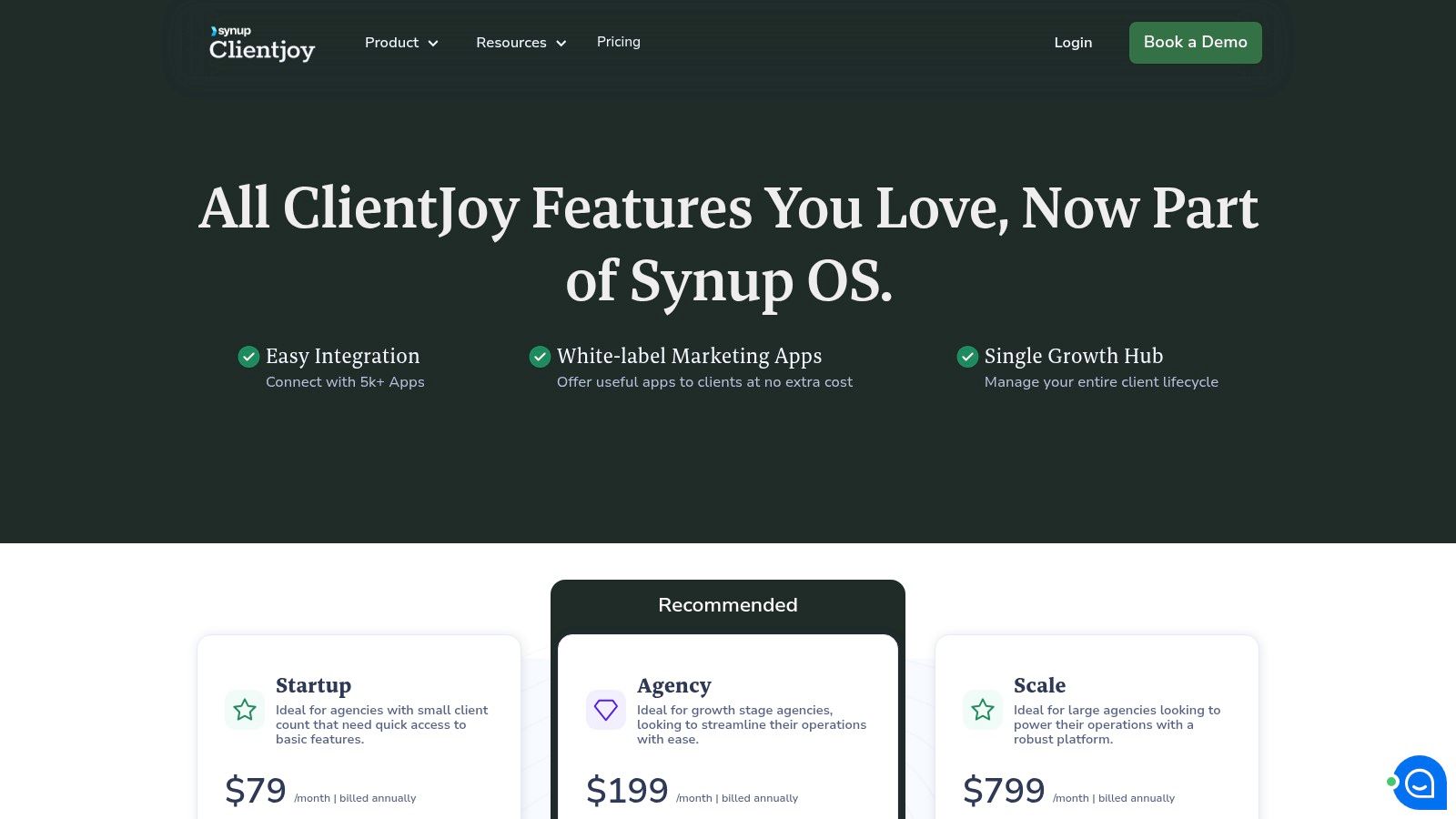
The platform stands out by offering white-labeling features, allowing agencies to brand the client portal for a more professional and seamless client experience. This consolidation means you can manage sales pipelines, send legally binding contracts, and issue invoices all from a single dashboard. Its straightforward approach simplifies client management without the complexity of larger, enterprise-grade systems.
Key Details & Pricing
- Best For: Small to mid-sized agencies wanting to consolidate sales, proposals, and invoicing into one system.
- Key Features: Integrated CRM, proposals and contracts, invoicing with payment gateways, and a white-label client portal.
- Pricing: Begins with a free plan for up to 3 clients. Paid plans start at $19 per user/month (Starter), with Growth ($39/user) and Pro ($79/user) plans offering more features, clients, and team members.
- Website: https://clientjoy.io/pricing
Pros:
- Consolidates core agency operations beyond just sales into one platform.
- Straightforward plan levels make it easy to choose a tier for your agency's size.
Cons:
- Has a smaller integration ecosystem compared to larger CRM platforms.
- Pricing mixes per-user and account limits, so it's important to confirm it fits your team structure.
Agency CRM — Top 12 Comparison
| Product | Core features ✨ | Lead integration & automation ✨ | Quality ★ | Price/value 💰 | Target audience 👥🏆 |
|---|---|---|---|---|---|
| HubSpot Sales Hub | CRM + sales automation, email/sequences, analytics ✨ | Native lead capture; real-time sync with FB via integrations; strong workflows | ★★★★★ | 💰 Free CRM; paid tiers scale to enterprise | 👥 SMB → Enterprise; agencies needing unified ecosystem 🏆 |
| Salesforce Sales Cloud | Advanced CRM, forecasting, custom objects ✨ | Robust APIs; native & partner FB connectors; real-time enterprise sync | ★★★★★ | 💰 Enterprise pricing; high TCO for add-ons | 👥 Large agencies / enterprises; complex pipelines 🏆 |
| Zoho CRM | Lead/deal automation, AI (Zia) on higher tiers ✨ | Native integrations + many connectors; good automation for lead routing | ★★★★☆ | 💰 Competitive pricing; strong ROI for SMBs | 👥 Cost-conscious agencies; breadth over depth |
| Pipedrive | Visual pipelines, automations, easy setup ✨ | Integrations for FB leads (native/third‑party); fast deal capture | ★★★★☆ | 💰 Mid-tier pricing; good value for sales teams | 👥 Sales-focused agencies / reps |
| monday Sales CRM | No-code pipelines, boards & automations ✨ | Connects FB via integrations; sync to boards for execution | ★★★★ | 💰 Seat-based pricing; flexible but can scale cost | 👥 Agencies managing delivery + sales |
| Freshsales (Freshworks) | Built-in phone/chat, AI insights, forecasting ✨ | Native connectors + marketplace; real-time lead handling on paid plans | ★★★★ | 💰 Free tier; competitive paid plans | 👥 SMBs seeking unified outreach |
| ActiveCampaign | Email + powerful automations + embedded CRM ✨ | Strong automation for FB leads via integrations; lifecycle routing | ★★★★☆ | 💰 Priced by contacts; great for marketing-heavy use | 👥 Agencies focused on lifecycle marketing 🏆 |
| Keap | Sales & marketing automations, payments/invoicing ✨ | FB lead capture via integrations; good end-to-end automation | ★★★☆ | 💰 Higher SMB starting price; all-in-one value | 👥 Boutique agencies / consultants |
| HighLevel (GoHighLevel) | White‑label CRM, funnels, SaaS Mode ✨ | Native FB integrations; built for reselling client sub-accounts | ★★★★ | 💰 Agency-priced; strong margin for resellers | 👥 Agencies wanting white‑label SaaS 🏆 |
| Copper | Google-native CRM; Gmail/Calendar deep integration ✨ | FB lead sync via connectors; seamless Google workflow | ★★★★ | 💰 Mid pricing; high productivity for Google shops | 👥 Google Workspace-centric teams |
| Scoro | CRM + PSA: projects, billing, resource planning ✨ | FB leads via integrations; links pipeline to delivery & finance | ★★★★ | 💰 Premium for PSA features; 5‑seat min | 👥 Creative/professional services needing end‑to‑invoice visibility 🏆 |
| Clientjoy | CRM + proposals, invoicing, client portal ✨ | FB lead capture via integrations; focused on prospect→payment flow | ★★★☆ | 💰 Simple tiers; good for small agencies | 👥 Agencies wanting consolidated sales→billing tool |
Choosing the Right System to Fuel Your Agency's Growth
Navigating the landscape of CRM for agencies can feel overwhelming, but the right choice will transform your operations from a set of disconnected tasks into a streamlined, revenue-generating engine. We've explored a dozen powerful platforms, from the all-in-one might of HubSpot and Salesforce to the niche-focused efficiency of HighLevel and the project management prowess of Scoro. Each offers a distinct approach to solving the core agency challenge: managing complex client relationships while driving new business.
The key takeaway is that there is no single "best" CRM; there is only the best CRM for your agency. Your ideal platform is a direct reflection of your unique workflows, client management style, and growth ambitions. A small, agile agency that lives in Google Workspace will find Copper’s native integration a game-changer, while a larger firm with complex sales and marketing processes may need the robust, customizable framework of Zoho CRM or ActiveCampaign.
Key Factors to Guide Your Decision
Before you commit, re-evaluate your agency's specific needs through this final checklist. The right CRM for agencies isn't just about features; it's about fit.
- Core Workflow Alignment: Does the CRM’s structure match how your team actually works? A platform like Pipedrive, with its visual pipeline, is perfect for sales-centric processes. In contrast, a service-heavy agency might prefer monday Sales CRM for its project and task management capabilities.
- Integration Capabilities: A CRM is only as powerful as its connections. Ensure your top choice integrates seamlessly with your essential tools, from your email marketing platform to your accounting software. Most importantly, verify its ability to capture leads from critical channels like Facebook Lead Ads. For those looking to dive even deeper into detailed comparisons and find the absolute best fit, explore this comprehensive review of the best CRM for agencies.
- Scalability and Pricing: Consider not only where your agency is today but where you want it to be in two years. A solution like Freshsales offers a free tier that's great for startups, but will its higher-tier plans support your future needs for automation and multi-client management? Don’t get locked into a system you'll quickly outgrow.
Your Actionable Next Steps
The journey to finding the perfect CRM for your agency culminates in practical testing. Reading reviews is one thing, but experiencing the software firsthand is what truly matters.
- Shortlist Your Top Three: Based on our analysis, select the three CRMs that most closely align with your budget, team size, and primary use case.
- Run Pilot Tests: Sign up for free trials. Involve a few key team members, including an account manager and a salesperson, to test the real-world usability.
- Focus on a Single Use Case: Don't try to test everything at once. Focus on a critical workflow, such as onboarding a new client or tracking a lead from initial contact to a closed deal. This will provide a clear, focused comparison of each platform's strengths and weaknesses.
Ultimately, choosing a CRM is a strategic investment in your agency's future. It’s the foundational system that will provide the clarity, control, and efficiency needed to not only retain your best clients but also consistently win new ones. Take your time, test thoroughly, and select the platform that will serve as your trusted partner in growth.
Is your agency struggling with the gap between Facebook lead generation and CRM entry? LeadSavvy Pro solves this by delivering instant, real-time notifications for new leads directly to your team via Slack, Discord, or Telegram, ensuring no opportunity is missed. Integrate it with your new CRM to supercharge your speed-to-lead and close more deals, faster. Try LeadSavvy Pro and connect your lead sources to your sales team in minutes.



